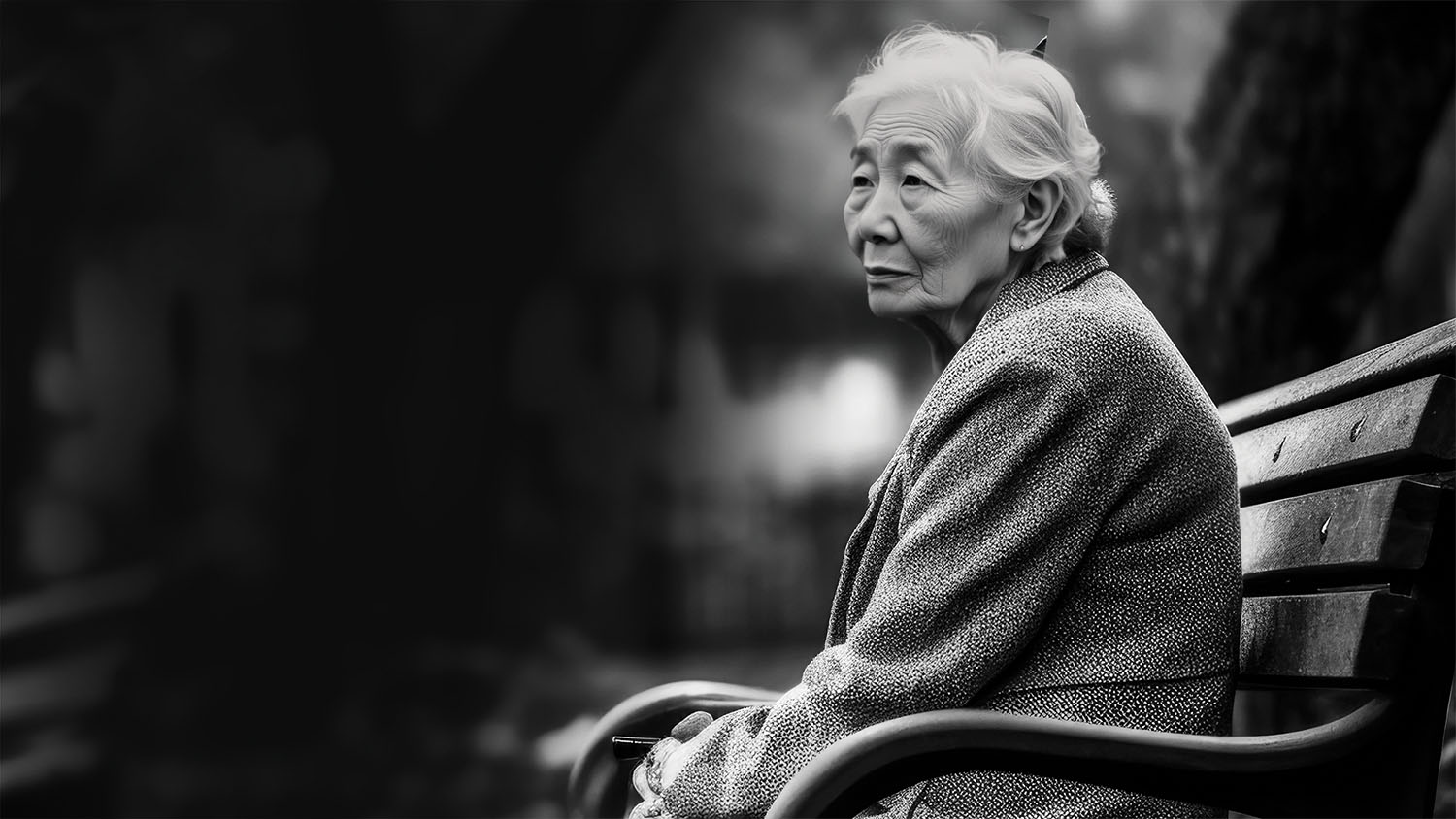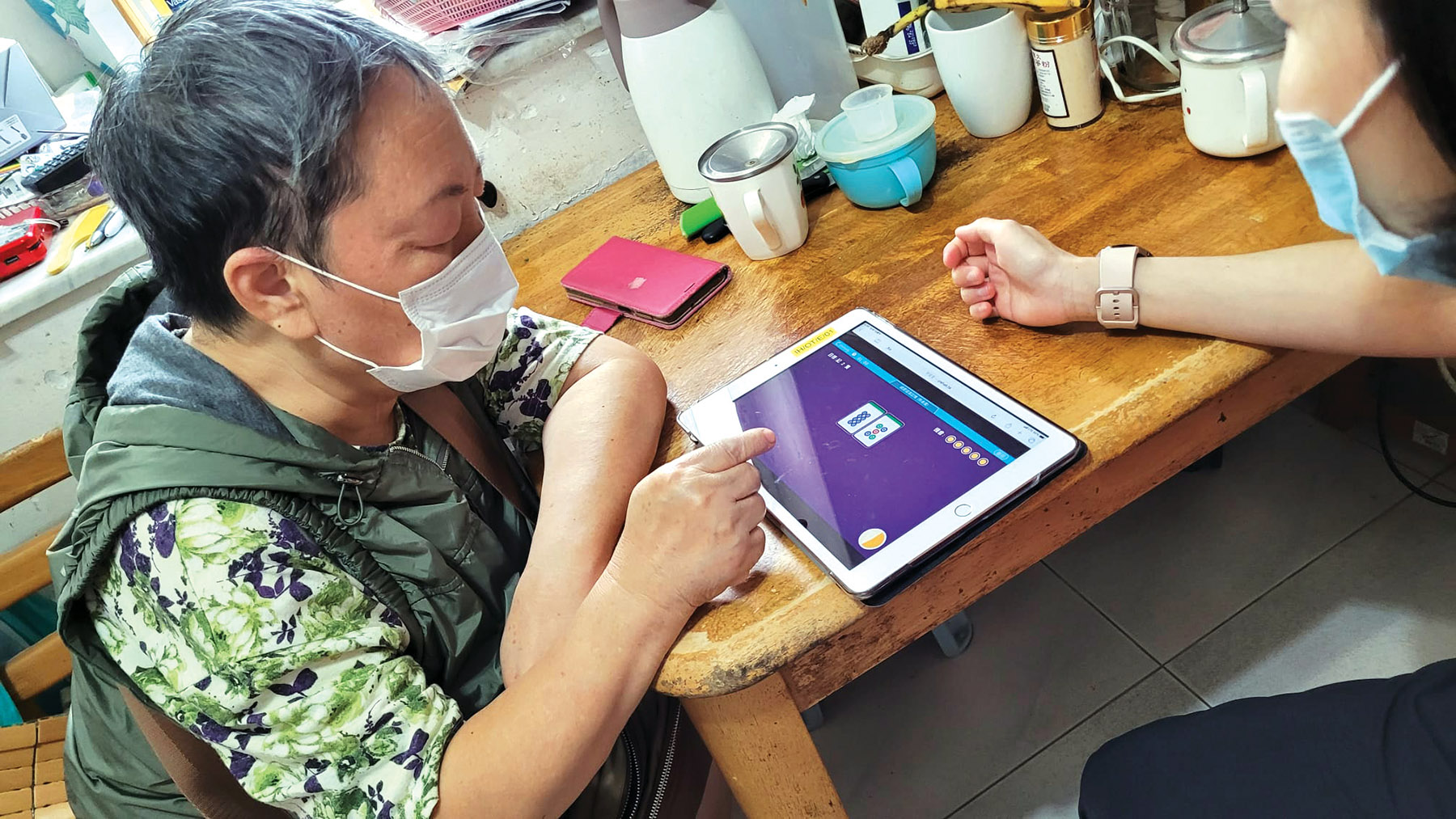Hong Kong’s rapidly graying population has given rise to more elderly people living in solitude. As Wu Kunling reports, volunteers and social groups are playing a key role in helping senior residents to lead happier and more meaningful lives in their sunset years.

At 74, Tse (full name withheld on request) has nothing much to look forward to. Her most treasured moment is, perhaps, a monthly visit by people she’s not acquainted with — social workers and volunteers — offering her solace and lifting her spirits in a life of loneliness.
The visitors would talk her up, play cognitive games with Tse in her cramped public rental flat and help her solve some basic problems associated with the advent of technology.
The septuagenarian is among a fast-growing crowd of empty nesters in Hong Kong — the elderly whose children have left them — and has been living alone for more than two decades. Tse has been physically inconvenienced since a road accident six years ago. One of the few daily physical exercises she’s able to perform is walking with a cane along the confined corridor of her flat.
Her health condition has restricted her life radius to a nearby market, the hospital and her home. Apart from leg problems, she has chronic illnesses requiring constant medical care and checkups. Keeping up with such a routine and regularly taking drugs prescribed by doctors has been a challenging task for Tse. “This is all I have left in life,” she laments.
READ MORE: Shall we talk some more?
Tse’s plight mirrors an identical predicament for many senior residents in Hong Kong living out their sunset years.
According to Hong Kong’s Census and Statistics Department, the number of elderly people aged 65 or above in the city had reached 1.64 million last year, taking up nearly 23 percent of the total population, marking Hong Kong’s transition to a super-aging society — one in which over 21 percent of the population is 65 and older — as defined by the World Health Organization.
Among Hong Kong’s elderly residents, some 188,500 live alone, comprising about 13 percent of the 65 and above age group. In addition, nearly 400,000 elderly individuals cohabit solely with their partners, also known as doubleton elderly households. These figures are expected to climb as the population ages.
Helping hands
Hong Kong’s empty nesters, including Tse, have been getting support from social workers and volunteer organizations to overcome the stresses and challenges in life. After undergoing surgery, Tse was referred to social workers who delivered her meals during her convalescence. They also got her involved in rehabilitation exercises and home visits for companionship and conversations after her recovery. Such support continues to this day.
Janet To Yun-lam — a 72-year-old volunteer and former hospital worker — says she has seen many elderly people traversing their final days in solitude. The sight persuaded her to dedicate her retirement years to helping them — a commitment she has continued to honor despite her age. After retiring, she has been volunteering to visit the elderly living alone since 2005, and has kept some of them company in their final hours.
However, volunteers are hindered in their work in cases where elderly people struggle to access relevant information, leaving them unsure about where to seek assistance or what sort of help is available. A significant number of seniors are also reluctant to seek or accept aid.
To recalls having made regular visits in 2006 to an elderly woman already in an advanced stage of cancer in hospital. The woman, once esteemed for her dignified career and exceptional work ethic, now faced a stark decline in health due to age and illness, and refused to accept help. “She would often tell me to throw her out of the window, saying she wasn’t worth saving.”
On several home visits, she has come across seniors who give volunteers the cold shoulder and reject help before eventually relenting. According to To, the elderly feel vulnerable and inferior due to their age and frailty, and would prefer to isolate themselves from society.
In fact, beyond emotional support and companionship, senior residents require help in various aspects of daily life.
Volunteers at the Association for Engineering and Medical Volunteer Services (EMV) for which To works say many elderly people, being unable to take care of themselves, often neglect their living environment, leaving their homes cluttered. The association mobilizes volunteers and teams up with businesses to provide home cleaning services for these seniors, along with healthcare, traditional Chinese medicine consultations, home repairs, haircuts, physical therapy and even training to prevent domestic accidents.
According to a social worker at the association, most of the volunteers are middle-aged or even elderly themselves, reflecting the acute shortage of staff, particularly young workers, in the eldercare sector who see such work as physically demanding and soiled. At the same time, not all volunteers are naturally fit for such roles, as effective communication with the elderly demands patience and specific skills.

Aging in place
Linda Lee Yin-king, a professor at the School of Nursing and Health Sciences at Hong Kong Metropolitan University, says elderly people living alone are confronted with challenges due to frail health, poor living conditions and financial hardship. Many of them have to put up with multiple health problems and a lack of immediate support in their daily routine, forcing them to curtail activities to avoid unnecessary expenses.
Lee points to a number of factors contributing to the plight of the elderly, including a surge in the number of Hong Kong residents emigrating in recent years, leaving many seniors separated from their families. Another key factor is the city’s generally overcrowded living environment, making accommodating multiple generations under one roof impractical.
She says while some have opted for care homes, most prefer to age within their communities. The choice isn’t just personal, but in line with the special administrative region government’s goals to care for the community. The authorities have continued to emphasize the principle of “aging in place” as the primary approach, with institutional care as a backup.
Lee says the goal of such an approach is to help seniors remain longer in their communities so that they can enjoy their sunset years rather than overcrowding care facilities.
To achieve the vision of aging in place, the government has been strengthening community elderly care services and initiating programs to suit those living alone. The city’s 213 district elderly community centers and neighborhood centers offer a diverse range of support services at the community level, including outreach programs to identify hidden or singleton elderly people and help them build social connections. The authorities also provide various care services, including home-based and center-based, with elderly people able to obtain these services by using community care vouchers. So far, some 4,000 singleton elderly people have benefited from such aid.
As of last year, there were more than 120,000 singleton elderly households living in public rental flats. The government has created an interdepartmental referral mechanism to address the housing needs of these tenants. Relatives or domestic helpers are allowed to live temporarily with singleton elderly tenants if necessary.
Subsidies are also given to eligible elderly households in public rental housing estates for installing an emergency call system, enabling solitary seniors to seek immediate assistance when in need. Free adaptation or modification works within units are also offered, such as installing entrance ramps, widening bathroom doorways, converting bathtubs into shower cubicles, and adding bathroom handrails, to better accommodate seniors’ daily activities.
Support network
To help the elderly fully tap into these resources, volunteers, particularly health workers, play a crucial role in bridging the gap between the public healthcare system and the community, says Lee. For example, they can help seniors articulate symptoms clearly during medical consultations. They can also help ensure that medications and treatments prescribed are taken correctly at home.
Volunteers residing within the community themselves are also able to efficiently identify elderly residents in need of help and respond promptly, says Lee.
However, compared with other places, like the United Kingdom, Hong Kong’s volunteer culture lacks robustness, with many volunteers showing short-term commitments, according to Lee. She suggests enhancing volunteer engagement through specialized programs, including courses for beginners, and providing prompt professional services to enable volunteers to truly enjoy their work and support those in need effectively.
In her view, volunteers are just part of the comprehensive support network for elderly people living alone, and the government should enhance community care services as demand increases amid an aging population. For instance, community rehabilitation services should be stepped up through the public healthcare system, and using volunteers and other resources to help the elderly regain mobility and self-care abilities after illness or injury. There should also be improved palliative care services in the community to support those who choose to spend their final days in familiar surroundings with their loved ones.
Gerontechnology has increasingly been discussed in recent years as a means to better late-life experiences. Under this theme, various activities, such as expositions, seminars and research projects, have been organized by the government, universities, charitable organizations, and the tech industry. Given that many seniors can’t afford technological products, organizations are offering rental services to ensure that all seniors, particularly those living alone, have the necessary support to spend their remaining years in comfort.
Lawmaker Bill Tang Ka-piu calls for technology to be included in the daily lives of the elderly to help them promptly report emergencies and seek help. For instance, if an elderly person falls, and remains immobile for over a minute, sensors could automatically alert the building management, or activate alert lights outside their doors to seek assistance from neighbors.
ALSO READ: Time to care for our carers
He says multiple government departments, including the Housing Authority and the Hospital Authority, should work together, combine resources and establish a registry for seniors living alone.
The presence of dedicated volunteers has brought a fresh dose of joy to Tse’s solitary life. Sometimes, she would find herself less lonely in the company of chatty and curious high school students who visit her regularly, reminding her of her grandson living abroad.
Peony Chau, 17, who has been working as a volunteer since late last year, says what they do is more than just visiting lonely elderly residents. They engage them in conversations and performances, encourage them to take part in cognitive games, and help them handle basic digital tasks like uploading photos onto cellphones to apply for a JoyYou Card, a type of Octopus card offering ticket concession for residents aged over 60.
According to the EMV, more young people have become volunteers in recent years to help seniors living alone, just like “fresh seeds taking root”.
Chau, an epitome of this trend, says her visits have restored smiles on the faces of seniors, especially during festive occasions like Christmas.
Yet, she’s aware there is no immediate panacea for solving the problem. Seeing the elderly’s conundrum in late life has made her realize that Hong Kong is far from ready to get to the bottom of it, and they, as part of the community, need to do more.
Contact the writer at amberwu@chinadailyhk.com


